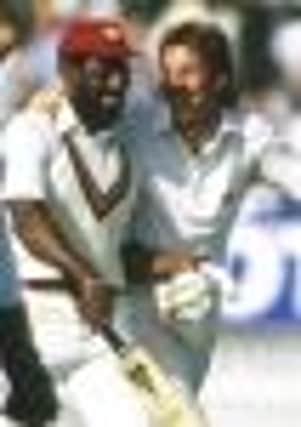Portrait of team who changed the game


Fire in Babylon is an action film, a political statement and a historical document, though both Battsek and Steel are at pains to distance themselves from such high-falutin’ claims. Their ambition, they say, was to make the definitive portrait of a unique group of men who forever changed the face of modern cricket.
There is a celebratory atmosphere to the film. More than that, it places in context what the team, comprising players like Viv Richards, Clive Lloyd, Michael Holding, Joel Garner and Colin Croft, achieved in the shadow of apartheid, race riots, civil unrest and the overwhelming impact of white prejudice.
Advertisement
Hide AdAdvertisement
Hide AdThe film begins with the familiar tones of Geoff Boycott as he observes the aggressive techniques of the West Indian fast bowlers. But Boycott’s admiration soon turns to disbelief and, ultimately, anger as he recognises that opposing players, not bails and stumps, are the bowlers’ targets. Boycott seemed to speak for many. The cricketing establishment reacted by changing the rules, as Battsek recalls. “Although that was at the top of the film [Boycott’s comments came] some way into the journey,” he says. “[The rules changed] when the West Indies started to beat everyone. The tables turned and instantly people, possibly the English, started to take steps to try and make it less deadly. That was all they could try and do: limit the number of bouncers, that sort of thing.We’re still trying. All teams now want to have deadly and amazing fast bowlers. It’s not easy and the simple answer is that all these teams did try and none of them could do it nearly as well.”
Fire in Babylon is a group biopic of a team that defined an era. The publicity blurb talks of “a game previously reserved for the privileged elite” and that Richards, Lloyd and the others represented defiance – “their symbolic declaration was clear: people of colour will not be dictated to”.
It took some persuasion to get all the various players to talk on camera. “They’ve all been interviewed a gazillion times and thought ‘Really, you want me to do another interview?’” says Battsek. “They all played hard to get.”
Both Battsek and Steel believe they hooked their big fish by proving that they wanted to make a truthful film. That meant focusing on the black players and leaving out their white opponents.
Advertisement
Hide AdAdvertisement
Hide Ad“We did a lot of interviews with players who faced the bowling, a lot of English batsmen, the occasional umpire,” reveals Steel. “In the edit it suddenly became clear that it was a love letter to the West Indies team.” Battsek continues: “To have the players who played against them wouldn’t have brought anything that you wouldn’t expect: ‘The bowling was really quick and I was scared out of my mind’, you know? It’s not often you get this completely authentic perspective. It’s literally their story told by them.”
Politics also play a part. Fast bowler Colin Croft’s career ended after he accepted a place on the 1982 rebel tour of South Africa. In the film he talks openly about his decision. To not include that aspect would be a mistake. But how to broach it?
“We always felt that the story needed to have that political context to warrant being seen on a screen and to be something larger than just recounting the events,” says Steel. “We were very nervous about how much we should mention that because a lot of people feel they are going to step into a minefield of controversy. “With Viv Richards [we wondered] ‘How are we going to bring that subject in delicately?’ Pretty much from the moment he started he went the whole way. You get that sense that they are relishing the opportunity to really delve into that. Whenever one embarks on this sort of project you’re trying to tell the definitive version of that story. You go for it with a passion rather than think ‘We’re going to try and make history’. It was an amazing period of their lives where they achieved something incredible. We just took it upon ourselves to put two-and-a-half years into making it.”
Fire in Babylon (12A) is on general release.